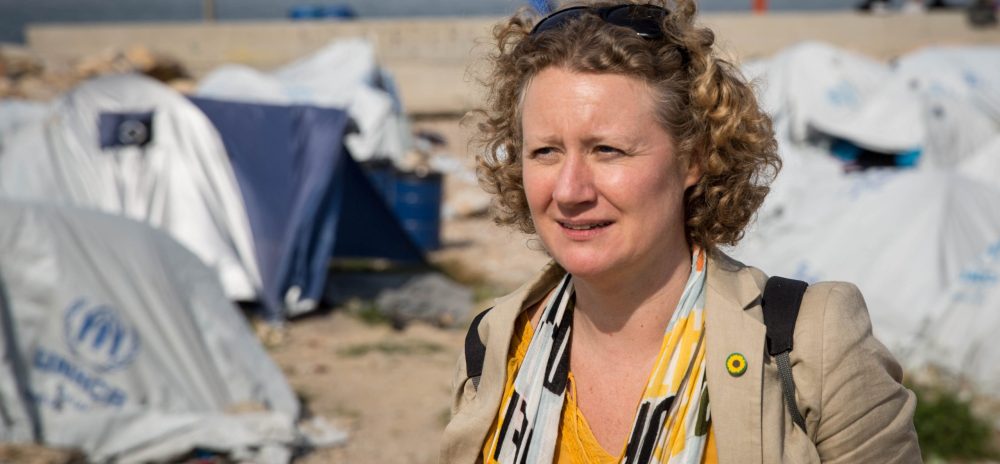
Judith Sargentini, ECDPM Great Insights magazine, Spring/Summer 2019 Special Edition (Volume 8, Issue 2 & 3). 13-6-2019
Dear Europe, dear members of the European Parliament,
After two terms in the European Parliament, the moment has come for me to pack my boxes, archive my files and close the door behind me. These have been ten incredibly interesting years. I look back with gratitude and some pride to several achievements in which I played a role, for example, on anti-money laundering, conflict minerals and of course the report on the rule of law in Hungary. The European Parliament is a place where you can make great things happen. It is technical work, it is law-making and it is politics.
It is disheartening though to see that some of the other topics I worked on relentlessly for these ten years made no progress at all. In some cases, you could even argue they moved in the wrong direction. I refer to asylum and migration policies of course. Here, things have not improved, and the political debate has hardened over the past ten years.
The Challenges of migration
In December 2016, I wrote a blog for ECDPM on the challenges of migration. It was the year after the height of the ‘migration crisis’ and the EU was still very much in crisis management mode. Today, I stand by the analysis of the EU’s response that I made back then: “The EU is moving away from policy coherence for development towards a strategy where development is used for policy coherence. A lose-lose strategy where development goals will not be reached, migration flows will not be stopped, the European Union’s geopolitical ambitions will not be met, and our credibility towards our African partner countries might be lost.” Less development aid is going to those countries most in need and migration routes continue to become more dangerous. At the November 2017 AU-EU Summit in Abidjan, I saw with my own eyes African countries’ increasing scepticism towards the EU’s migration frames.
We need this generation of European leaders to break through the impasses, pursuing policy coherence for development, humane and evidence-based approaches to migration, and agreement on return and resettlement policies.
Now, two and a half years after that writing, migration remains a top political priority, and nearly every single European law on migration has been re-opened. The motivation for reviewing these laws – the idea that more effective laws will help us cope with the “migration crisis” – at the same time has made it impossible to agree on any of them. With the sole exception of the European Border and Coast Guard, which was successfully concluded in the very last weeks of the mandate, all pieces of asylum law remain stuck at the Council’s table. It is illustrative of the state of the Union that the European Border and Coast Guard was the only piece of asylum and migration law that could be concluded. An additional 10,000 people will help guard Europe’s borders. Yet, no agreement could be reached on a change of the Dublin Regulation, or to resettle the most vulnerable refugees from UNHCR camps to the EU. A law on how to measure and define migration statistics didn’t even make it through. Too political. Member states don’t see eye to eye. It can’t be sold at home. It is the humane approach as well as solidarity among member states that keeps losing out.
Open-ended business
I spent my last months as an MEP negotiating two important migration policies. The first, a recast of the “Returns Directive”, deals with the return of asylum seekers whose claim for asylum has been denied. Return is an integral part of any migration policy. Political parties differ widely, however, on how this should be organised, and these differences proved too big to overcome in election time. Experience shows that voluntary return is by far the most effective and financially sensible approach. Policies focused on forced returns sound tough, but fail to deliver, and due to the need for detention, are very costly. My proposals to invest in voluntary returns, to ensure sufficient legal redress options, to use detention only as a measure of last resort and to never lock up children proved too contentious. The next parliament will have to pick up this file. I urge you to follow a humane and evidence-based approach here, in line with human rights and international law.
The second policy I worked on these past months aimed to determine how foreign affairs funds can be spent in the future, under the Neighbourhood, Development and International Cooperation Instrument(NDICI). I did my best to safeguard development funds from the increasing pressure of the EU’s foreign policy interests. The foreign policy interests of the Union have become more prevalent in EU development policies, to the detriment of long-term and predictable poverty eradication. In this way, the EU is discrediting itself as a champion of a norms-, values- and rights-based world and of human rights worldwide. Think about how the EU has threatened that it will reduce trade and aid if developing countries do not take their people back, and how it sends people back to detention centres in Libya.
Urgent measures needed
The negotiations with the European Council still need to start. I am wary of the direction the member states may try to push the European Parliament and I bid you to pay close attention to this. Most important is to ensure that sufficient predictable funds remain available for least-developed countries to be spent on poverty eradication. The Lisbon Treaty’s article 208, my favourite article, calls for exactly this, as well as for policy coherence for development. Now that the member states want to increase flexibilities in the budget and spend ever more on migration and security, it will be a task for the next European Parliament to scrutinise the spending, to ensure the money goes to the right places and to monitor that other policies are coherent with development.
The new parliamentarians will have to take up all these challenges and new ones. We only have ten more years to go to achieve the Sustainable Development Goals. Also, if we want to keep global warming below 2 degrees, we need to ensure that the Paris Agreement is implemented as soon as possible. You have a chance to work on policies that make that happen over the next five years. The urgency of these goals was not felt strongly enough during my term. I sincerely hope it will be during yours. It must.

About the author
Judith Sargentini, Member of the European Parliament – Greens–European Free Alliance, 2009-2019
This article was published in Great Insights Volume 8, Issue 2 & 3 – Spring/Summer 2019 Special Edition


